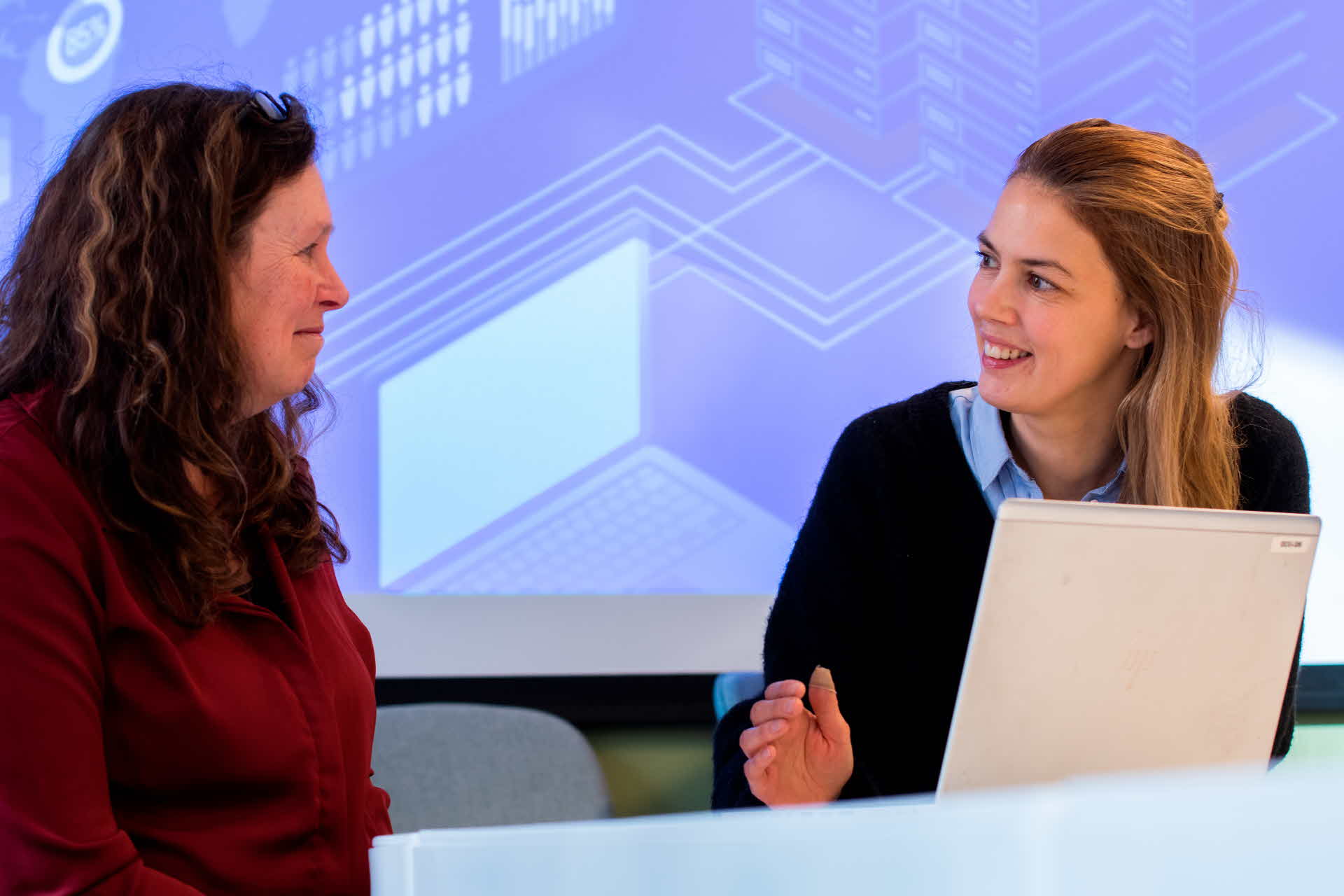
- SUSTAINABILITY
- SUSTAINABLE GOVERNANCE
- MATERIALITY ASSESSMENT
- STAKEHOLDER DIALOGUES
Stakeholder dialogues
SCA engages in continuous dialogue with various stakeholder groups in order to raise awareness of the areas they believe should be prioritized. The key issues in 2024 were the EU Deforestation Regulation, the role of forest in combating climate change, the conservation of forest biodiversity and the EU Corporate Sustainability Reporting Directive (CSRD).
The dialogues not only provide us with an insight into what stakeholders believe we should prioritize, they also help us to reduce negative impacts and enhance the positive impacts our business can contribute. The dialogues also help us in our efforts to continuously improve our value creation.
The business areas maintain a close dialogue with their customers and follow up customer satisfaction through surveys, face-to-face meetings and third-party assessments. SCA regularly meets investors, analysts and financial players.
We maintain a continuous dialogue with our suppliers to ensure quality and deliveries as well as the continued development of purchased goods and services. The Group performs All Employee Surveys and annual goal and performance reviews with its employees.
We also communicate with other groups and individuals in matters that have a major impact on society in general and local communities in particular, and hold regular meetings with individuals living near our operations. We also maintain a close dialogue with NGOs, such as conservation organizations as well as Sami communities in reindeer herding areas.
Stakeholder dialogues provide insights into the expectations of various interest groups, help to cultivate long-standing relationships and continuously improve the Group’s operations. In addition, these dialogues provide valuable information when we assess our sustainability program and prioritize sustainability initiatives.

Key stakeholder issues in 2024:
- EU Deforestation Regulation and Fit for 55
- The forest’s role in work to combat climate change
- Preservation of biodiversity in the forest
- New Corporate Sustainability Reporting Directive (CSRD)
Key issues by stakeholder group
How we conduct dialogues
Customer visits, meetings, interviews, participation in customer events and seminars, trade fairs, mailings, website, social media, regular contacts by e-mail and telephone.
Main topics
Climate, environmental impact, ecolabelling, fiber sourcing, chain of custody, forestry, biodiversity, human rights, reindeer herding, health and safety, expertise, market, customer benefits, business development, resource efficiency, energy market, innovation, digitalization, quality, product safety, logistics and security of supply.
How we address the issues
- Customer surveys, questionnaires and customer visits.
- Close dialogue with customers to develop the company’s value chain.
- Dialogue about product safety, climate, responsible forest management, chain of custody.
- Training in the company’s Code of Conduct and Supplier Standard.
- Development of new products and service concepts together with customers.
- Life cycle management of products.
- Visit to customers by SCA experts in various fields.
- Customers who perform audits of SCA’s operations.
- Customer magazines and newsletters, such as SCA Wood Magazine and New Ways.
- Ecolabels, for example Nordic Swan Ecolabel.
- Sustainability assessment by EcoVadis.
- Environmental Product Declaration (EPD).
How we conduct dialogues
Performance reviews, workplace meetings, engagement meetings, work councils, online surveys, intranet, internal courses, management meetings.
Main topics
Value-based culture, occupational health and safety, attracting and recruitment, skills development, succession planning, compensation and benefits, business ethics, working conditions, resource efficiency, environmental impact, product development, strategic development.
How we address the issues
- The Group’s ZERO initiative for developing a health and safety culture.
- Internal digital channels (intranet, electronic displays, Instagram and webinars).
- The discussion tool “How do we act?” and training in SCA’s Code of Conduct, anti-corruption and business conduct.
- Participation in student fairs and partnerships with the educational sector.
- SCA’s podcast “Ingenjörspodden”.
- Introductory course for new employees, skills-enhancement activities, leadership training, Early career programs and internships.
How we conduct dialogues
Investor meetings in conjunction with, for example, interim reports, capital market days, risk reports, the AGM, interviews, website.
Main topics
Financial performance, market outlook, sustainability, areas of growth, renewable energy, degree of self-sufficiency, forest valuation, risk management, corporate governance.
How we address the issues
- Annual General Meeting.
- Investor visits to SCA’s operations.
- Regular investor and analyst meetings during the year.
- Roadshows in conjunction with quarterly accounts.
- Risk management as part of the Board of Directors’ Report in the Annual report.
How we conduct dialogues
Regular meetings and presentations. Specific reporting in accordance with loan documentation and public reporting on our website.
Main topics
Financial information, risk analyses, sustainability assessments, corporate governance.
How we address the issues
- Continuous dialogue with commercial banks and other creditors.
- Investor meetings in connection with major bond issues.
- Periodic reports and certificates to all creditors.
- Annual Green bond report.
- Continuous dialogue and reports to rating institutes.
How we conduct dialogues
Follow-up meetings, request for tenders and procurements, interviews, website.
Main topics
Health and safety, supplier audits, business ethics, human rights, energy consumption, resource efficiency, climate impact.
How we address the issues
- SCA’s Supplier Standard as part of contracts.
- Supplier assessments and follow-up meetings.
- Risk-based supplier audits performed on-site.
- Training of procurement employees.
- Assessing countries and suppliers from a sustainability perspective.
- EcoVadis platform for evaluation and follow-up of suppliers.
- Follow-up meetings with individual suppliers.
How we conduct dialogues
Forest owner meetings, physical and virtual meetings, customer magazine, website, social media.
Main topics
Long-term and sustainable forestry, generational renewal, management methods, forest management plans, ownership rights, forest management certification, nature conservation, profitability.
How we address the issues
- Business contacts on an ongoing basis during the year.
- Customer satisfaction interviews with private forest owners.
- Forest owner meetings and participation in trade fairs.
- Collaboration with Skogscertifiering Prosilva AB (group certificate).
- “Din Skog” customer magazine for forest owners.
How we conduct dialogues
Meetings concerning specific issues, interviews, reporting to ecolabels and sustainability indexes, websites.
Main topics
Forest management, biodiversity, climate and environmental issues, resource efficiency, green energy, human rights, hunting, reindeer herding.
How we address the issues
- Dialogue with local, regional and national stakeholders.
- Onsite visits to the company’s forests and dialogue with reference groups in
conservation parks. - Memberships and involvement in organizations such as the Swedish Forest
Industries Federation, the Confederation of European Paper Industries (CEPI),
FSC and PEFC, Bioenergy Europe and the Swedish Wind Energy Association. - Continued revision of relevant standards and ecolabels.
- Continued development of ecolabels and standards for calculating climate benefit from forests and forest-based products within ISO (ISO 13391/FDIS 13391).
- Collaboration with BirdLife Medelpad to restore wetlands and improve conditions for birds, such as Ural owls.
How we conduct dialogues
Dialogue meetings, local events, public consultation, interviews, websites.
Main topics
Occupational health and safety, environmental issues, local issues, renewable energy, reindeer herding, labor market, education, community engagement, diversity issues, human rights.
How we address the issues
- Dialogues with regulators, government authorities, municipalities and lobbyists.
- Consultation and dialogue about investments, permits, employment and other local issues.
- Consultation meetings with local Sami communities and residents living near to SCA’s industrial sites and forests.
- Board representation or participation in organizations for regional development, such as chambers of commerce and Junior Achievement Sweden in the northern counties.
- Participation in Skogen i skolan and the development of Linnaeus University’s forestry bachelor program in northern Sweden.
- Supervisory and annual reporting to government authorities, including environmental reports.


